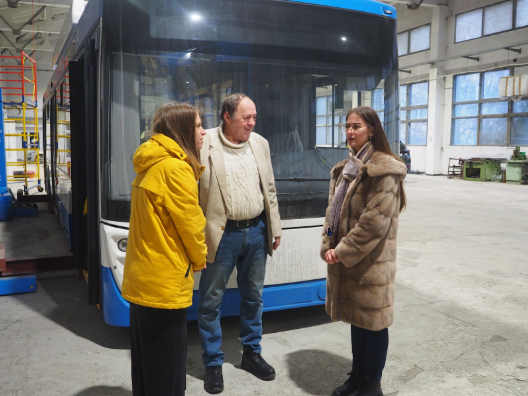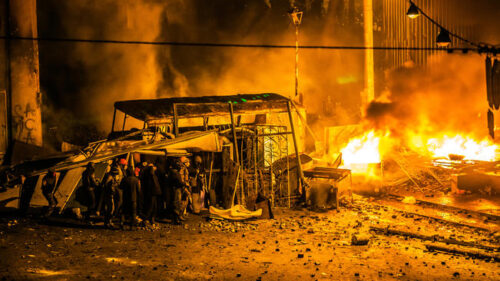Imagine riding home from work on a packed trolleybus. It’s rush hour and most people in this city ride trolleys. Tired women carrying shopping bags and men smelling of cigarettes are swaying in the same rhythm—the bus squeals and shrieks along the way.
Suddenly, every trolley stops. Being used to power cuts, you scoff and dismount. It’s going to be a long walk home.
This is what life in Chisinau, the capital of Moldova, was like in the early 2000s. Electricity was expensive and scarce, and the country needed help keeping up with the load.

About a decade earlier, on December 25, 1991, the Soviet Union had collapsed. The high inflation that followed led to the increase of prices for energy resources, according to the IOM 2001 report. Most electricity was generated in the Russia-controlled breakaway region of Transnistria. There were constant negotiations over the price of electricity, which led to poor transportation in Moldova.
But the nation had a trick up its sleeve: It knew how to build and fix things.
A Soviet electronics powerhouse
These days, Moldova is commonly known as an agrarian state. Lush fields are vital to its economy. But things were different during the Soviet Union. Local engineers made televisions, integrated circuits, and military systems for submarines, among many other products. This information comes from Elena Maevski, project coordinator at The Association of Electronics Companies in Moldova (ACEM).
Moldova was the third-largest supplier of electronic equipment among the socialist republics, according to ACEM. As proven by Ion Bostan, a former Technical University of Moldova rector, electronics brought the most revenue to the state budget when Moldova was part of the Soviet Union.
In his book Engineering Sciences and the Cooperation with Industry in the Republic of Moldova, Bostan revealed many secrets about the industry. He showed how the electronics Moscow ordered from Moldova helped control, manage, and monitor military equipment.

That all changed with the Soviet Union’s collapse. Moldovan companies lost their old market. The budget for education and sciences dropped in the independent country struggling economically. But their expertise remained.
Some 20 years later, the companies and their engineers are slowly resurfacing. Moldavizolit produces PCB laminates and other materials for the electronics industry. Electromash Ltd. makes generators and electric motors for the coal and nuclear power industries, as well as others.
Their leaders are starting to speak about their work for the first time. Vitalie Eșanu, a legendary engineer and a professor at the Technical University of Moldova, is prominent among them. He is the founder and CEO of Informbusiness, a technical-scientific enterprise that develops and manufactures equipment for urban public transport.
A city in search of a solution
To combat the power cut dilemma in the gloomy 2000s, Chisinau turned to Eșanu to make trolleybuses more energy-efficient for the city. This began a journey that led to the invention of world-class electronics.

Vitalie Eșanu, the CEO of Informbusiness, is a legendary engineer and a professor at the Technical University of Moldova. Authors’ photo.
Informbusiness designed and assembled electronics to allow trolleybuses to run further on less energy. Their solution made Chisinau’s transportation around 40% more efficient. Before the 2000s, one trolley consumed 3-3.5 kilowatts per kilometer (kW/km). Company engineers were able to reduce it to approximately 2 kW/km.
Since then, Informbusiness has sold its gadgets to 170 cities worldwide. They power trolleybuses, trams, and trains. In December 2023, the company opened Moldova’s first trolleybus assembly factory. Their engineers created Moldova’s very first electric bus. This battery-powered transport consumes just 0.75-0.85 kW/km.
Informbusiness engineers are particularly proud of the battery storages that accumulate energy for their electric buses; they enable the vehicles to travel up to 450 kilometers on one charge. “This is a product that practically has no analog today, not even in the USA or Europe,” Eșanu told us, “because it helps the vehicle go that far.”

Informbusiness covers 18% of the electronics in Chisinau’s transportation sector. “This gives us a large testing ground,” explained Alexandru Motroi, the company’s technical director. Being able to test their electronics in real-life situations is a rare advantage to have.
The company’s disadvantage, however, is its obscurity. Not only is Informbusiness unknown globally, but even locals know little about it.



Informbusiness trolleybuses improve San Francisco’s safety
So we visited their factory in a Chisinau suburb. A hidden path led us underground to a lower level. Here, elderly mechanics weld and polish general parts. Upstairs, engineers devise new inventions. In the middle of that room stands a switching device. It is an exact replica of the ones they export to San Francisco, California — they help American trolleybuses run more smoothly.
The engine is directly connected to the network in electric transport, explained Alexandru Motroi. When the trolleybus starts moving, it draws the energy straight from the socket, causing abrupt movement. Informbusiness’ gadget makes the transition smoother. Without this device, the passengers would tumble whenever a trolleybus stopped or started. This equipment is also used in Chișinau, making trolleys safer and providing a smoother ride.
Eșanu and Motroi have never been to San Francisco themselves. Their work has traveled farther than they have.

Trolleys are a part of city life
Trolley buses are central to Chisinau’s daily life. Most people still use them on their daily commute. Though noisy, they are efficient and more ecological than diesel buses. Ultimately, this is a story of how the collapsing Soviet military-industrial complex produced something much more worthwhile than weapons of war: technology to help people travel safely.

[Lee Thompson-Kolar edited this piece.]
The views expressed in this article are the author’s own and do not necessarily reflect Fair Observer’s editorial policy.
Support Fair Observer
We rely on your support for our independence, diversity and quality.
For more than 10 years, Fair Observer has been free, fair and independent. No billionaire owns us, no advertisers control us. We are a reader-supported nonprofit. Unlike many other publications, we keep our content free for readers regardless of where they live or whether they can afford to pay. We have no paywalls and no ads.
In the post-truth era of fake news, echo chambers and filter bubbles, we publish a plurality of perspectives from around the world. Anyone can publish with us, but everyone goes through a rigorous editorial process. So, you get fact-checked, well-reasoned content instead of noise.
We publish 2,500+ voices from 90+ countries. We also conduct education and training programs
on subjects ranging from digital media and journalism to writing and critical thinking. This
doesn’t come cheap. Servers, editors, trainers and web developers cost
money.
Please consider supporting us on a regular basis as a recurring donor or a
sustaining member.
Will you support FO’s journalism?
We rely on your support for our independence, diversity and quality.







Comment